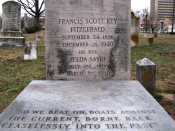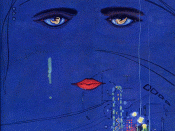Would you ever go to any lengths to achieve goals in which you desire, even if it means pretending to be someone you're not? This is what many people, past and present, have done in order to attain their dream of living the life of wealth, liberty, and happiness. That dream is the American Dream. Both the novel, "The Great Gatsby", by F. Scott Fitzgerald, and the film, "The Talented Mr. Ripley" directed by Anthony Minghella in 1999, appropriates the idea of failure and corruption of the American Dream and self reinvention to reflect the futility of pretence in a post war context.
In The Great Gatsby, self reinvention mirrors the rapidly changing society of post war America 1920s, where social barriers are fluid, enabling the transversal of previously rigid social boundaries. In this context, Jay Gatsby's reinvention is not to fulfil a lust for power and wealth, but due to a naïve belief that through material gain he can win back Daisy's love as seen in his dialogue "I'm going to fix everything to the way it was before".
Gatsby's transformation is also illustrated by night imagery, "as he walked across the moonlight", where it symbolises his enigmatic character, mysterious ways, and also his ephemeral lifestyle.
In pursuit of the American dream and ultimately perfection, Gatsby began to revolutionize his own character to achieve perfection in himself, in order to acquire Daisy's love. Not only is Gatsby trying to reach perfection but he is also trying to attain a place in the upper class. The beauty and splendour of Gatsby's parties masks the decay and corruption that lay at the heart of the Roaring twenties. Although he struggles to be a part of this world, he remains unalterably an outsider as he was not born into...


